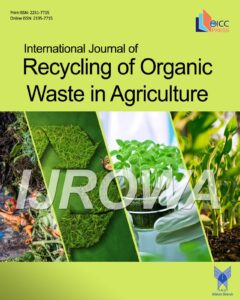
Background: As objective of this study was focused on efficacy of composting of a recalcitrant organic waste material, co-composting of coir pith with cow manure and rice bran was endeavored to evaluate influence of initial C/N ratios, i.e., 30, 25, and 20, on physico-chemical changes, e.g., temperature, pH, organic matter (OM) degradation, and total nitrogen […]
Background: In West Bengal, India, a huge amount of lignocellulosic jute waste products, in the form of unutilized cut pieces of jute caddies consisting 65% cellulose, 22.5% hemicellulose, and 11% lignin, is generated from jute industries. Naturally, the high percentage of lignocellulolytic material made it an attractive substrate for the hydrolytic cleavage of lignocellulolytic enzymes, […]
Background: In this study, wheat bran, an agricultural waste, was utilized as a low-cost carbon source for algal cultivation. Results: Treatment of lignocellulosic waste by two fungal species (Pleurotus ostreatus or Trichoderma viride) caused the accumulation of reducing sugar at a relatively high concentration (50.58 and 54.30 mg/g wheat bran) after 7 days of incubation, […]
Background: The Southern Guinea savanna zone of Nigeria is characterized by inherently low soil fertility status and rapid nutrient depletion especially soil organic matter. However, this zone is characterized by abundant agricultural land and is a potential for crop production. Field experiments were conducted in order to evaluate the effects of integrated use of agricultural […]
Background: The swine production is a very important economic matter, occupying prominent position in the worldwide market. However, it appears as the greater impacting activity for the water resources. Researches point a swine manure production of 105.6 million m3 /year in Brazil, which resulted in a piggery wastewater rich in solids, nutrients, heavy metals, and […]
Background: While the increase in the number of coconut-based industries in Malaysia supports economic growth positively, it affects the environment negatively by generating large amounts of coconut wastes. This study has endeavored to assess the possibility of vermicomposting different types of coconut wastes and, in doing so, evaluated the potential of using the African nightcrawler […]
Background: Agricultural waste has been proposed as an alternative energy resource to meet fossil fuel crisis, green house emission, and other environmental impacts worldwide. In Iran, rice husk and bagasse are main resources of biomass which can be used to produce syngas. This paper deals with a simplified model of combined gasification of coal and […]
Background: The application of biosolid as a fertilizer in agricultural cultivation is a common practice in many countries. This study investigates the effects of sewage sludge and compost usage on soil chemical properties and Zea mays nutrition in comparison with those of iron and manganese sulfate solution. The experiment was carried out in a completely […]
Two of the main concerns for wastewater reuse in agricultural irrigation are environmental and human security. Different research studies and practices have been developed recently in order to quantify the risk of possible environmental contamination of surface and groundwater resources as well as the risk to public health from enteric viruses. Other, far from negligible, […]
Background: The entrance of untreated wastewater or disposal leachate to water resources such as surface water, groundwater or irrigation water increases the risk of contaminant accumulation. Removal or deduction of water contaminant concentration is then crucial before entering water to the natural resources or its transfusion directly to the soil as irrigation water. Four studies […]
Background: Improving levels of organic matter in desert soils is necessary for their cultivation. A two-year study (2008 to 2010) was conducted on a sandy clay loam soil at the experimental research farm of the Omdurman Islamic University, Sudan to determine the effect of application of crop residue, sewage sludge, and humentos on selected soil […]
Different substrates have several materials which could have direct and/or indirect effects on plant growth and development. Therefore selecting the best substrate between the various materials is imperative to plant productivity. This research was carried out with using a completely randomized design with three treatments and seven replications. The treatments were including perlite, date-palm waste […]
Recent trend of declining sustainability in agricultural production is appearing as a major threat to most of the Asian countries. To combat the situation, increasing importance is now being paid on incorporation of organic materials for rejuvenating the health condition and, hence, the productivity of these soils. Large scale availability of conventional organic manures being […]
Background: Low-cost and suitable microcrystalline cellulose powders for use in the pharmaceutical industry can be derived from agricultural residues. Most commercial microcrystalline cellulose powders are produced from dissolving pulp obtained from expensive hard woods using concentrated acids. α-Cellulose was extracted from an agricultural residue (corn cob) using a non-dissolving method. The spectroscopic, thermal and physicochemical […]
Background: The present investigation was undertaken to assess the residual influence of organic materials and biofertilizers applied to rice and wheat on yield, nutrient status, and economics of succeeding mung bean in an organic cropping system. The field experiments were carried out on the research farm of IARI, New Delhi during crop cycles of 2006 […]